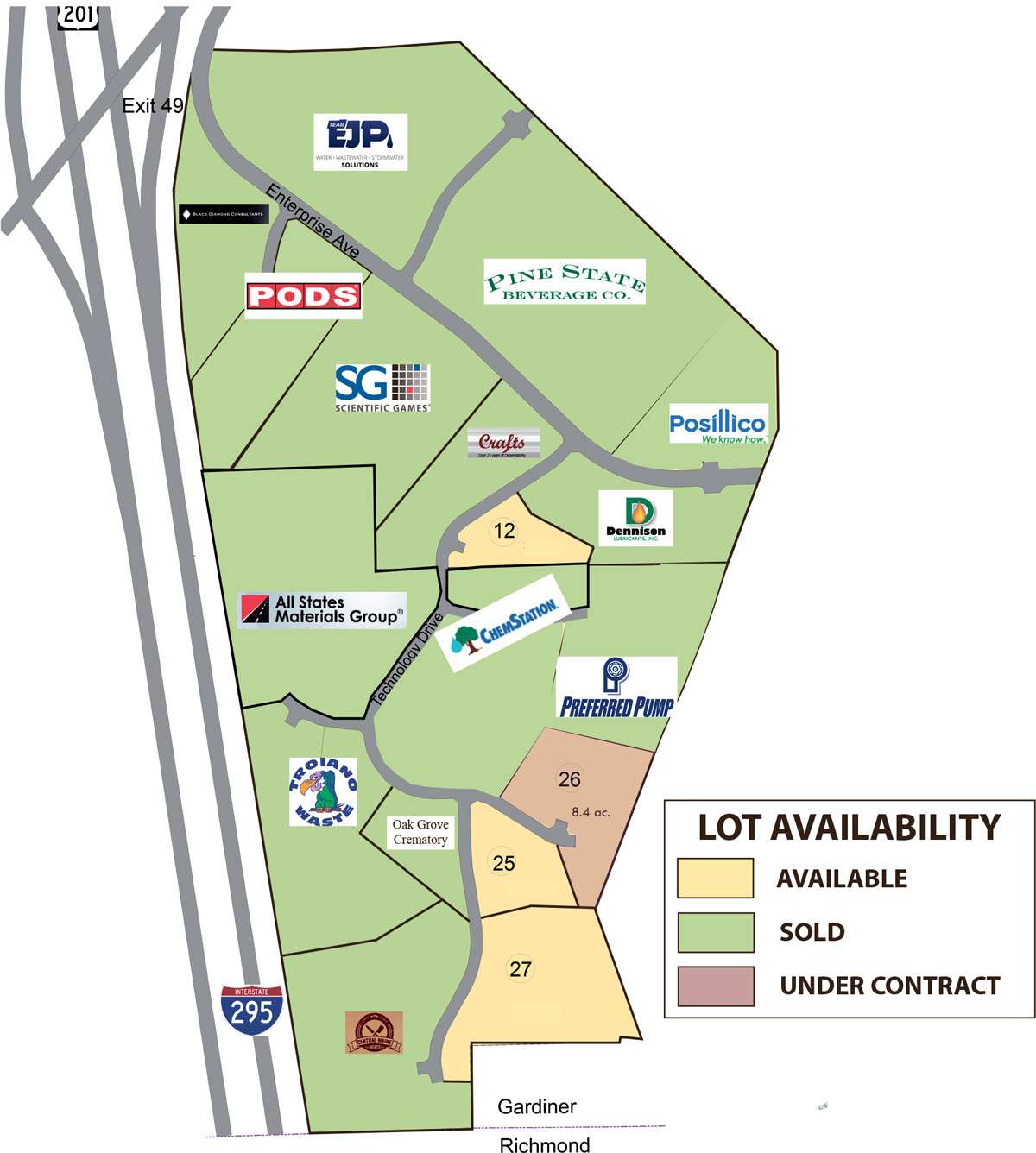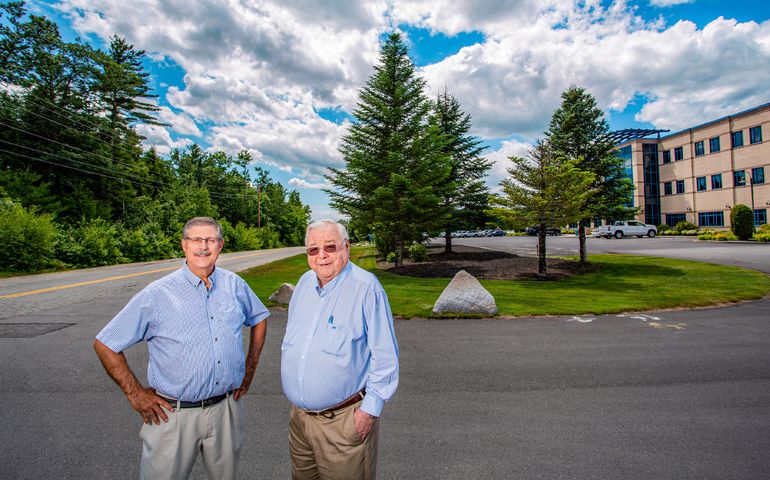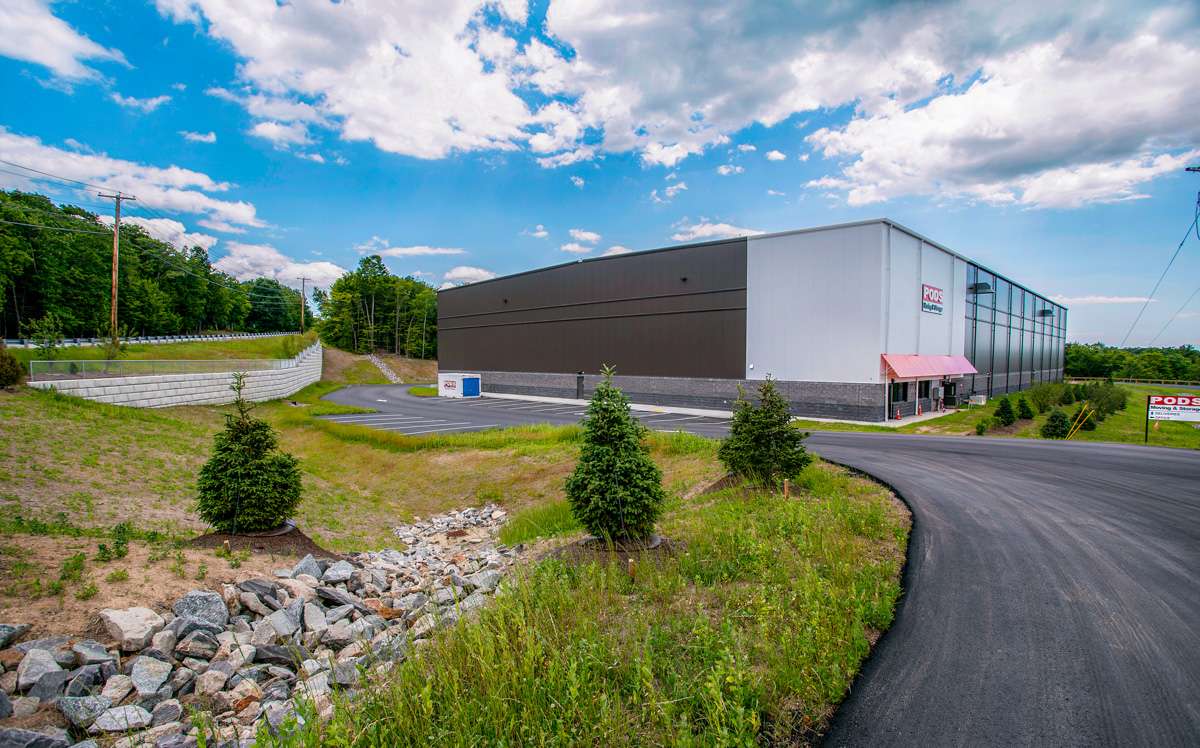
Hoping to attract business, this central Maine city built a park — and they came
 Photo / Tim Greenway
Peter Prescott, right, president and second generation owner of Everett J. Prescott Inc., bought one of the first lots in the Gardiner 95/295 Business Park. Dennis Wheelock of KW Commercial/Magnusson Balfour says the park's strategic location is a selling point.
Photo / Tim Greenway
Peter Prescott, right, president and second generation owner of Everett J. Prescott Inc., bought one of the first lots in the Gardiner 95/295 Business Park. Dennis Wheelock of KW Commercial/Magnusson Balfour says the park's strategic location is a selling point.
In the early 2000s, Everett J. Prescott Inc. was looking for potential locations for its expansion.
The company’s second-generation owner and president, Peter Prescott, learned the city was considering establishing a business park at a spot called Libby Hill, south of the downtown.
Prescott agreed to buy the first lot at what was originally called the Libby Hill Business Park and is today called the Gardiner 95/295 Business Park.
In 2004, the expanding company built its 58,000-square-foot headquarters building there, just minutes from the vital interstate highway link to its growing service area. The company, founded in 1955 in Gardiner, offers water-main tapping and underground boring, working with a range of clients. The company’s operations have been growing, and the business park fit its needs.
“It’s a nice area, plus we needed the room,” says Prescott. “We’d been in downtown Gardiner 50 years. So when I heard about this, we decided to move out here. It’s worked out very well for us.”
Last year, Everett J. Prescott expanded its facility as it doubled the size of its operation and added territories. Today, it has 85 employees at its headquarters and, with 30 sites in New England, New York, Indiana and Ohio, it has 400 total.
In addition to the space to expand his headquarters, Prescott says, he was attracted to the perks the city built in, in its quest to attract business — affordable shovel-ready lots with public infrastructure already in place. Plus, the park sits just off Exit 49 of I-295 and Route 201, making it a key location for distribution.
“We were lucky to get the chance to be one of the first ones to come here,” says Prescott. “And then others followed.”
Long time coming
It took a while to reach the park’s full potential.
“This project was a long time coming for the city,” says Tracey Desjardins, Gardiner’s director of economic development and planning.
The park is viewed as a central location in a business-friendly city. Its construction began in 2000 with Phase I’s 120 acres and 12 lots. Phase II was 107 acres with 16 lots.
Phase 1 immediately attracted Everett J. Prescott and Pine State Beverage. The feeling at Gardiner City Hall was that other lots would fill immediately. But sales stalled along with the economy in 2008.
Things eventually turned around. In 2017, Dennis Wheelock of KW Commercial/Magnusson Balfour took over the park’s marketing. He and the city decided to change the name of the park, from the Libby Hill Business Park to the 95/295 Business Park, to emphasize its strategic location — sitting up against I-295, less than a mile from I-95 and reaching much of the state’s population within an hour’s time.
Another marketing point is its infrastructure amenities, including maintained roads, stormwater, domestic water, sewer, three-phase power, and highspeed internet to each lot. Businesses looking at raw land have to factor in their costs to develop similar infrastructure, says Wheelock, who notes, “Whereas that’s all taken care of in this business park. Our price includes all of those costs and it’s shovel-ready.”
Wheelock says he receives regular inquiries from prospective buyers due to low purchase prices and businesses looking for expansion opportunities. Listings that range from 3.6 to 15 acres are today priced at $49,900 to $124,750.
In addition to Everett J. Prescott and Pine State Beverage, businesses include Common Wealth Poultry, Scientific Games, Troiano Waste, Dennison Lubricants, Central Maine Meats, Oak Hill Crematorium and Crafts Transport.
Interest from potential buyers in recent years stems in part from Portland’s tight industrial inventory, says Wheelock.
Sanitation franchise
Last year, the park signed on a sanitation franchise in Weymouth, Mass.
Rich and Jim Nissi are father-and-son partners who have a franchise with ChemStation, a Dayton, Ohio, company that provides customers with custom-formulated, environmentally friendly industrial cleaning products delivered to refillable containers directly to customer facilities. The plan is to open their first Maine location to serve a growing clientele.
Rich Nissi says he opened the Weymouth franchise in 2004 and entered the Maine market in 2008. Today, he has 50 to 100 clients in Maine and is adding an average of one per month. Clients include wild blueberry and seafood processors, bakeries and breweries throughout Maine.
The goal is to break ground in 2023. Nissi discovered the park through Common Wealth Poultry, a customer of ChemStation’s that has its facility at the park.
“We looked around the park and said, ‘Yes, this might be the right place,’” he recalls.
Advantages of the location, he says, include the people of Gardiner.
“We like the townspeople,” he says. “It’s evident that they’re encouraging businesses in any way they can. A lot of times towns take the opposite approach.”
Plus, he continues, “Gardiner is smack dab in the middle of the state for us.”
Another lot, says Wheelock, has completed construction for the Hauppauge, N.Y., corporate storage center for PODS, a moving and storage portable container service headquartered in Clearwater, Fla.
Other companies arriving in recent years include Auburn Asphalt, which is part of Sunderland, Mass.-based All States Materials Group. Posillico Real Estate and Construction of Hampton Bays, N.Y., bought two lots with the idea of building a business incubator.

Tool manufacturer
More recently, James Graham, owner and president of Core Cutter in Farmingdale, worked to finalize a deal for a lot that will accommodate his company’s expansion.
The company, founded in 2017, manufactures high performance carbide cutting tools. Today, it has 10 employees and has grown from three to seven CNC machines.
For now, Core Cutter occupies 5,550 square feet at 362 Maine Ave. in Farmingdale, which is just north of Gardiner. “We’re out of room,” says Graham. “The only way we’ll be able to hire and buy more machines is to have bigger spot.”
Initially, Graham was thinking that he would be able to find a relatively local warehouse at an affordable purchase price. He looked for over a year and found that wasn’t the case.
“There was nothing on the market that fit our need,” he says. “There was space available for lease. But the problem is, with my type of business, we’d dump so much money into the building, it didn’t make sense to lease. So we definitely wanted to buy something.”
Born and raised in central Maine, he remembered when the park was established. “I’ve known about the park for a long time,” he says. “Recently, there’s been a lot of companies moving in there.”
The infrastructure was a big draw. “We rely on solid three-phase power for all our equipment,” he says.
The plan is to build a steel manufacturing building of at least 10,000 square feet, which will have room for 16 CNC machines and support equipment and will accommodate future expansion. The goal is to break ground next spring and be operational by winter 2023.
“It’s been a pleasant experience,” he says. “When we met with the city council for approvals, they were great to deal with.”
Coming to fruition
When Wheelock took on the park’s marketing, there were 12 lots available.
Now there are three lots and one of those is set to go under contract.

“The biggest thing the park has going for it is being close to 295 and 95, especially for these companies that are trucking all kinds of goods,” he says. “That’s really made a difference.”
The park is part of a tax increment financing district, and most buyers have taken advantage of the tax break, says Wheelock.
“We were also really aggressive with the pricing of the lots in order to be super competitive,” he says. “When you can buy a lot for $50,000 and it already has city sewer, water and electricity and paved roads that the city plows, we’re comparable to the price of raw land and having to add all that to your costs.”
Originally, says Desjardins, the question was, “If we build this park, are they going to come?”
The answer? “It was a slow start, and I think now the city is starting to see things come to fruition as far as the hard work they and their partners put into building this park,” she says. “That’s huge.”
Gardiner is now seeing spin-off benefits. “We’re seeing people who work at the park coming into the downtown, spending money,” she says. “The close proximity to the highway makes it enticing for people wanting to be in the park. People want to come and locate here, not only to work here but also to live here.”
The city is also happy to see companies coming from out-of-state, she says. “And they have workers who might be relocating to the area,” she notes. “There’s definitely a mix.”
What makes out-of-state companies bite? “They always say, ‘Location, location, location,’” Desjardins says. “Folks I speak with say they want that presence in the Northeast.”
Says Prescott, “The park gives everyone the room they need and it’s a beautiful location.”










0 Comments